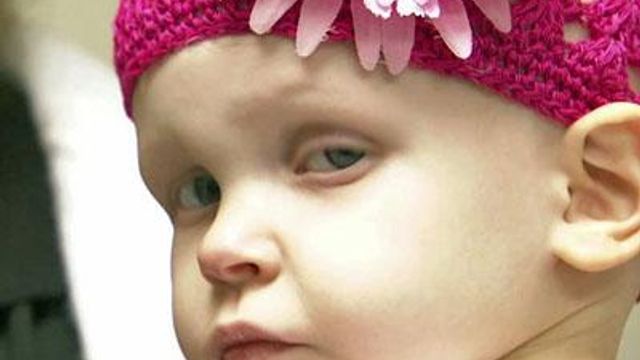Antibody treatment attacks childhood cancer
Duke Children's Hospital is part of a cooperative of research institutions whose work is giving new hope for children stricken with neuroblastoma cancer.
Posted — UpdatedNeuroblastoma is the most common cancer in infancy and presents tough survival odds for children. Tumors develop in nerve tissues in the neck, chest, abdomen or pelvis and move to nearby structures, including organs and bone.
Wobbly walking led to a diagnosis of neuroblastoma for 1-year-old Delilah Jones.
"I was just thinking, maybe it's a phase she's going through. I didn't know what it was," Delilah's mother, Jorien Jones, said.
A tumor formed on Deliliah's adrenal gland and has spread to other structures. It shrunk a little after chemotherapy, but Duke pediatric surgeon Dr. Henry Rice says Delilah will soon undergo surgery to remove as much of the tumor as possible.
"In the world of pediatric surgery, this is one of the toughest technological challenges that we have," Rice said.
Other treatments will also be open to Delilah at Duke, which is one of 16 research institutions that are part of the NANT Cooperative. The group identified a gene mutation that led to an immune therapy approach.
"We use an antibody that recognizes a neuroblastoma cell as foreign, and together with the immune system, it kills it off," Duke pediatric oncologist Dr. Dan Wechsler said.
A study published in the New England Journal of Medicine found that the therapy improved survival. An initial trial with a control group of patients not receiving the therapy was ended, because the children receiving the therapy responded so well.
Standard treatments gave children only a four out of 10 chance, but with the antibody therapy," six out of 10 of those kids will go on to be cured and not have the tumor come back," Duke pediatric oncologist Dr. Susan Kreissman said.
Delilah might undergo the antibody therapy and a cutting-edge stem-cell transplant, depending on how well she recovers from surgery.
"We're going to see how the situation is at that point, and then we're going to the transplant. We're going to be here for about five weeks," Jones said.
The antibody therapy is available in safety trials to all children who might benefit from it. Duke Children's Hospital is the only facility in North Carolina offering the therapy.
Researchers say a drug called MIBG is also a promising treatment for neuroblastoma. The drug delivers a radioactive molecule directly to the tumor. That helps patients avoid the type of radiation that affects the whole body.
Duke is the only facility in the state where MIBG is available in clinical trials.
• Credits
Copyright 2024 by Capitol Broadcasting Company. All rights reserved. This material may not be published, broadcast, rewritten or redistributed.





